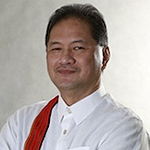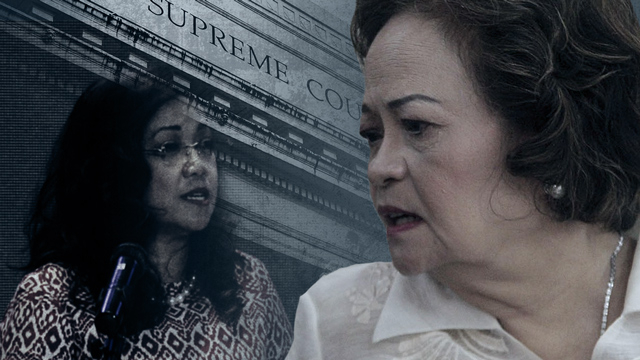
The Supreme Court’s unparalleled move to allow a member of the Court to appear before a committee of a co-equal branch and testify against no less than the highest magistrate of the land is one that will be etched in history.
Yet for all the publicity – good or bad, depending on the source – that a justice of the Court appearing before the House committee on justice to determine whether or not a sitting Chief Magistrate should be impeached is, by any stretch of the imagination, actually bad for the Supreme Court and the judiciary as a whole.
It, in effect, undermines the independence of a separate branch of government by allowing another branch to encroach on its constitutional prerogative.
I am sure Justice Teresita Leonardo de Castro is sincere in her belief that doing what she did was the right thing to do, by narrating publicly her side on her disagreement with the Chief Justice on the matter of Administrative Order No. 175-2012 designating the head for the Judiciary Decentralized Office(JDO) in the Seventh Judicial Region.
In her mind, this order did not reflect previous Supreme Court en banc resolutions mandating the creation of the Regional Court Administrative Office (RCAO). However, without intending to, I am sure, Justice De Castro may have opened the door for Congress to stick its foot into internal matters.
Administrative matters should be properly resolved by the Supreme Court on its own; without interference from outside bodies and definitely without bringing in the political branches. Internal disagreements between and among members of the Court should also not be the subject of an impeachment complaint. Otherwise, the specter of continuous internal conflict within the Court will become a permanent feature among the so-called gods of Padre Faura.
It should be recalled that Justice De Castro stated that what the Chief Justice created (JDO) was a permanent office unlike the RCAO which was created by the Court as an ad hoc body to be implemented for only one year. She also mentioned that the existence of the JDO is dependent on the discretion of the Chief Justice; hence the character of permanency.
What might be missing here is that the creation of the JDO had been approved and ratified by the Supreme Court en banc by way of a resolution. That the Supreme Court supposedly withdrew its approval eventually, as De Castro was insinuating, is well within the Court’s prerogative. But this does not in any way constitute a rebuke on the Chief Justice’s action. Nor did it constitute a drastic move to brand her action illegal or unconstitutional.
After all, the Court occasionally reverses itself or overturns a decision by a division penned by a member, even one written by the Chief Justice himself or herself. The supposed setting aside of A.O. 175-2012 is, for all intents and purposes, of the same nature. In effect, the SC resolved the issue on the creation of RCAO. It is an internal matter as it involves the proper administration of the courts in the seventh judicial district; hence, the Court’s decision should have been deemed final.
On the alleged unauthorized creation of the JDO by the Chief Justice, the Supreme Court can create offices albeit ad hoc in nature until institutionalized by the legislative body in an appropriate legislative act. Thus, the Philippine Judicial Academy was created by the Supreme Court on March 12, 1996, under the leadership of then chief justice Andres R. Narvasa, through the issuance of Administrative Order No. 35-96.
Later its existence was mandated under Republic Act No. 8557. This is also true with the Public Information Office or PIO. As to whether or not the JDO assumed a permanent character is a matter of opinion but one cannot deny that the SC en banc can always deny its creation as it supposedly did abolish it when one was already existing. The bottom line is that the Chief Justice is not the Court; the existence of the JDO is dependent on the collective wisdom of the whole Court.
The RCAO was created as early as 2008 with a budget, personnel, and equipment. The Chief Justice did not create that office herself. Decentralization is a positive reform so the inefficiencies of decentralization are addressed. Needless to say, if all decisions were to be made in Manila, resolving concerns and administrative problems of judges and court personnel in far flung areas will have to wait; and delays are not only inefficient but can also cause undue wastage.
In my view, Justice De Castro’s appearance before the House Committee on Justice was unnecessary. She was called because the complainant said she was the source of documents. But she and reporter Jomar Canlas had denied it.
Rightly, Justice De Castro distances herself from the impeachment complainant Larry Gadon who has been accused of commiting perjury by alleging that he had personal knowledge of the grounds of his complaint. The good Justice, in the Sandiganbayan and the Supreme Court, has a good reputation to protect.
Dragging her into this impeachment of her colleague, especially association with a flawed complaint and a process where the constitutional right to counsel and cross-examination of the Chief Justice has been denied, can damage that reputation. Already, some have questioned Justice De Castro’s motivations. I do not share that criticism and accept her explanation that she was just doing the right thing in voicing her objections.

The Supreme Court en banc did hear Justice De Castro’s objections and had already made decisions with respect to that. Indeed, in most of the grounds of impeachment alleged by Mr Gadon, the Supreme Court has made the necessary collegial decisions, making it unnecessary for the political branches to get involved.
For the record, I am not absolutely opposed to Justices and Supreme Court officials appearing before the House committee on justice. Impeachment is a solemn duty of the legislature with both houses of Congress assigned their designated roles. Everyone should cooperate in the process, as long as constitutional rights are safeguarded along the way.
Because of this, I support the Supreme Court decision allowing Justices and judicial officials to appear before the House Committee but subject to specific conditions and parameters. One of those conditions I am sure is that the questions they will be asked would be relevant to the impeachment. Administrative matters and all internal debates within the Court should be outside of this scope. Unfortunately, the De Castro appearance does not stand up to this requirement.
My hope is that, in the future, the scope of the questions to be directed to other Justices and court officials would be consistent with this scope. Otherwise, we are in a slippery slope towards the Supreme Court and the judiciary, already the weakest branch of government, becoming completely at the mercy of the political branches.
There is no walking back from that; future Chief Justices and Associate Justices will, from now on, become sitting ducks whenever they make decisions that displease powerful economic and political interests. – Rappler.com